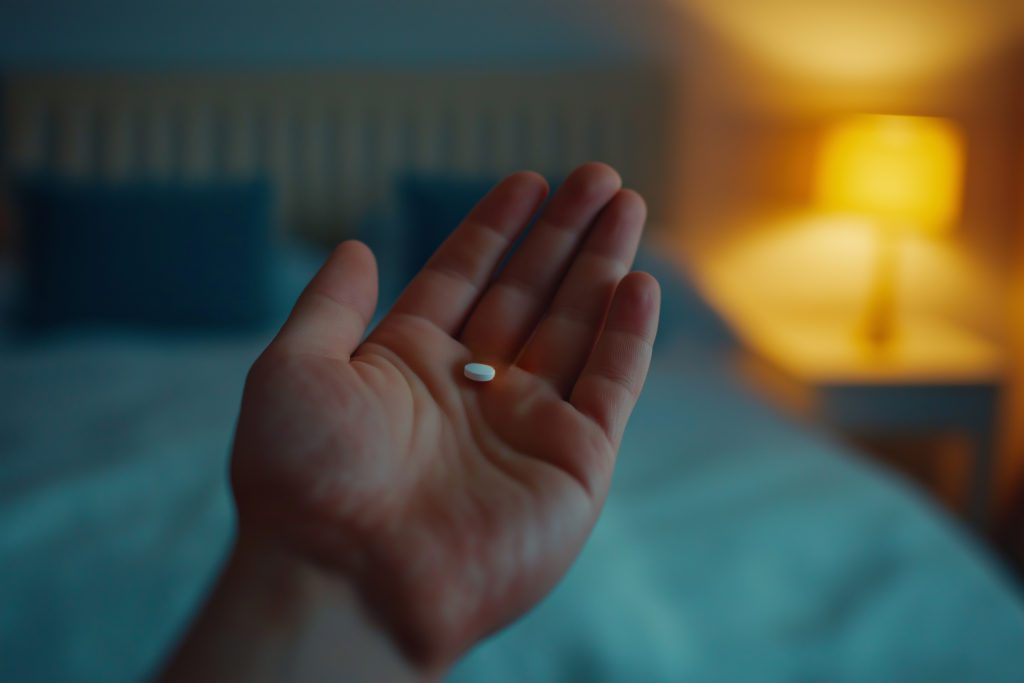
Influence of Medications on Sleep and Pain
Sleep and pain influence each other, with pain making it hard to sleep and sleep loss increasing pain. Explore how medications can weigh into this dilemma

For those who suffer from chronic pain, sleep is crucial to keep your pain levels down. However, pain can make it hard to fall asleep, creating a vicious cycle that leads to sleep deprivation and a greater sensitivity to pain, which then makes sleep difficult to come by.
Pain medications can help to lower your pain levels, making it possible for you to fall asleep and get the sleep crucial for maintaining your pain tolerance. However, some medications can affect your sleep—knowing how they affect your sleep and working with your doctor around these challenges can help you preserve your sleep.
The Relationship Between Sleep and Pain
Pain and sleep closely impact each other—not sleeping enough at night can make you more sensitive to pain, and being in pain can make it hard to fall asleep. As expected, this can create an endless cycle of pain and poor sleep that can deplete your quality of life. To add onto this, anxiety, worry, and fear often tag along with these sleep problems and chronic pain, which can make sleep even more challenging to obtain.
The connection between sleep and pain is so solid that researchers have even considered using sleep as a target for pain management therapies.
One connection between sleep and pain has to do with the relationship between sleep and the immune system, which is bidirectional. Some proinflammatory cytokines can have sleep-promoting effects, which serve the purpose of having you rest while sick in order to improve your immune system’s function. Conversely, sleep loss can induce an inflammatory state that impairs immune response.
Furthermore, sleep disturbances can increase your pain sensitivity at both the sensory and emotional levels of the pain system. This is likely because of the proinflammatory effect seen when someone experiences sleep loss, which has been shown to increase pain complaints.
Deep sleep, in particular, may be of great importance when it comes to mediating pain. Decreases in deep sleep have been observed in those who suffer from neuropathic pain, with pain medication helping to restore deep sleep duration, increase overall sleep time, and lower sleep loss-associated pain. Research also suggests that restoring the amount of deep sleep following sleep deprivation elevates your pain threshold.
Disturbances in other sleep stages have also been linked to higher pain levels. For instance, a shorter duration of N2 sleep has been linked to greater pain intensity in those with fibromyalgia.
How Pain Medication Hinders Your Sleep
If you’re considering pain medication, it’s important to be aware of the effect that it may have on your sleep. Namely, the ways in which it may hinder your sleep.
Increases Wakefulness
One way in which pain medication may hinder your sleep is by increasing your amount of wakefulness, which can impair sleep efficiency. These effects have been observed with nonsteroidal anti-inflammatory drugs, such as ibuprofen.
Additionally, some over-the-counter remedies contain caffeine and other stimulants, which can make you feel energized at a time when you should otherwise be sleepy.
Disturbs Sleep Stage Distribution
Yet another effect of pain medicine on your sleep is in regard to its distribution of your sleep stages. Acetylsalicylic acid (ASA) was shown to increase N2 sleep and decrease deep sleep. Notably, these effects were seen after four days of administration but not after only one dose, offering a challenge for those with chronic pain who take pain medications each day.
Opioids, as well, have been shown to decrease N3 sleep while increasing N2 sleep. Some studies have even found that opioids reduced the amount of REM sleep, as well.
Other Medications That May Influence Your Sleep
It’s not just pain medication that can influence your sleep:
- Heart medications can keep you from getting enough deep REM sleep, and some may lower your body’s level of melatonin, which can cause you to wake during the night.
- Diuretics may cause you to wake during the night with a need to urinate, leading to disrupted sleep.
Antidepressants have insomnia as a common side effect. - Cholesterol medicine can cause muscle pain that may make sleep difficult.
Corticosteroids can cause you to feel energized even when you should be sleepy. - Antidiarrheals slow down muscle contractions in the gastrointestinal system, which can cause drowsiness.
- Drowsiness is one of the most commonly reported side effects of medications, which can cause daytime napping, a practice that may hinder your ability to sleep at night.
How Pain Medications Improve Sleep
While some pain medications have been shown to conversely affect your sleep, the opposite may be true as well.
First and foremost, by reducing pain, pain medications can increase your comfort, which may make it easier to fall asleep.
Beyond this simple fact, though, some pain medications have been shown to improve sleep. For instance, gabapentinoids have been shown to increase total sleep time, and antidepressants even offer a sedative effect that can help you fall asleep if administered close to bedtime.
Managing Medications and Pain to Sleep Better
With all the medications that can cause sleep challenges, it may be hard to pinpoint which one is causing your sleep problems. Working together with your doctor, you can narrow down the medications that may cause sleep challenges and come to a solution that retains your health.
In addition to taking pain medication, there are other techniques that may help you sleep better if you have pain, such as:
- Relaxation Techniques. Relaxation techniques such as meditation, guided imagery, or breathing exercises can help to distract your mind from the discomfort, which may allow you to sleep easier. As a bonus, these techniques can be used no matter where you are, whether day or night. Meditation, in particular, may help to alter your perception of pain, lowering your pain sensitivity.
- Yoga. Yoga can help relieve some of your pain, with research showing its success in decreasing pain in those with osteoarthritis and chronic lower back pain.
- Upgrade your mattress or pillow. Your mattress and pillow are sleep tools that need to be supportive enough; otherwise, they may contribute to your pain. If you have a chronic pain condition like arthritis or back pain, having proper support as you sleep can make a huge difference in how well you sleep.
- Keep a sleep schedule. No matter how tired you feel when you try to sleep, get yourself on a sleep schedule. It may be hard at first, but stick with it, and soon you’ll feel tired at your set bedtime. Following a schedule helps to enhance your natural sleep drive and ensure you’re able to get enough sleep each night, which can keep your pain threshold from dropping.
Ultimately, pain and sleep are closely connected, with a lack of sleep contributing to pain and pain making it difficult to sleep. Pain medications can help manage pain, but some may be hindering your sleep. Your best choice is to talk to your doctor—sometimes, changing the time you take your pain medication may be all that is needed to restore your sleep and live your days with less pain.

Written by
Jessica G
Medical writer freelancer who has written hundreds of articles on varying topics. Masters of Engineering degree in Biomedical Engineering.
Download Pillow
Get help
Press & News
Legal
Connect
X (Twitter)
Company
Copyright © Neybox Digital Ltd.



